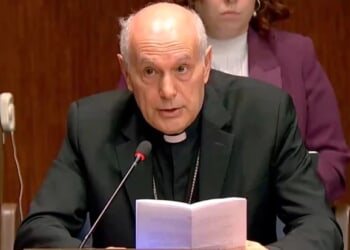“Io sono Giorgia!”
“I am Giorgia!” she proclaimed in a now-famous speech. “I am a woman. I am a mother. I am Italian. I am a Christian, and you can’t take that away from me.” And three years after this defiant 2019 appearance on the political stage, Giorgia Meloni added yet another powerful proclamation: “I am the Prime Minister of Italy.” In the three years since, she has become perhaps the most consequential of European leaders, the one who best embodies a forward-looking solution to Europe’s malaise.
Palin was hated, above all else, for embodying an alternative vision of feminism, and it’s a vision that still needs an avatar.
Instead of the self-absorbed fantasies of France’s Macron, the tedious lawyerisms of the U.K.’s Starmer, or the constipated whines of Germany’s Merz, we have someone insistently joyous and ready — more than ready — to push for solutions. Has she turned off the spigot of uncontrolled immigration? Not yet, but she’s way out in front of all the others, all the more notable given Italy’s front-line status. Has she led Italy out of the European Union as many hoped? No, but after being initially stigmatized by the Brussels bureaucracy, she’s now become the indispensable woman if Europe is to be revitalized. (RELATED: Meloni’s Italy: A Refreshing Crescendo to Brussels’ Dissonance)
At a time when support for Ukraine was deeply unpopular among her own supporters, she stood strong. It’s no accident that, when Ukraine’s President Zelenskyy and a cadre of other European leaders gathered with President Trump in the Oval Office, Meloni, the leader of perhaps the weakest of the major European countries, took center stage alongside Trump, quite literally in the seating arrangements of the meeting, and also as, so we’re told, the leader who inserted the notion of a “NATO-lite” security guarantee into the discussion. Some have taken to calling her “the Trump whisperer.” (RELATED: Security Guarantees and Peace in Ukraine)
A woman, then, a mother, proudly representative of her nation, outspokenly Christian at a time when most of Europe seems embarrassed by the very notion of Christianity. “Make Italy Great Again?” As she moves from strength to strength, facing down a long-entrenched left-wing establishment, one hopes for her continued success, and if it continues for the next several years, one wonders what worlds she might yet want to conquer. I, for one, wish that she’d been born in the United States, because I would love to see her at the head of the Republican ticket in 2028. (RELATED: Italy, Giorgia Meloni, and the Future of the West)
We once had someone, briefly, who offered for one dazzling moment something akin to the speech with which Meloni announced herself on the political stage in 2019. Therein lies a lesson in both what might have been and how such moments can go disastrously wrong. I’m thinking of Sarah Palin and her vice-presidential candidacy. Before Palin became a reality TV cliché, before Donald Trump turned reality TV stardom from a political liability to a political asset, there was Sarah Palin, the political force who threatened to upend every calculation about the 2008 presidential election.
When John McCain selected the then-governor of Alaska to be his vice-presidential running mate, the initial response was one of puzzlement, of a sense that there was something almost whimsical in the choice, yet another example of McCain going out of his way to validate himself as a political maverick. Alaska would bring nothing in terms of electoral votes, nor did the governor have a significant record of accomplishment.
But all of this changed on the night of September 3, 2008, when Sarah Palin stepped to the podium at the Xcel Energy Center in Saint Paul, Minnesota, to accept the nomination. Little was expected of her, and much of the country, including many of the Republican convention delegates, wondered just who this woman was, assuming that her speech would offer little more than a low-key apology for assuming such a prominent position on the national political stage.
Instead, what they — and the country — got was the political equivalent of a grand slam home run, and more a grand slam by a rookie who only the day before had been called up from the minor leagues, and, by most reckonings, not even AAA ball. Governor of Alaska? The pols had not been impressed, and even less so by her previous service as mayor of Wasilla, population about 6,000 at the time. And no one saw a political rock star in the making.
She did it all that night. Her’s was a genuine Meloni “Io sono Sarah” moment. She introduced herself, inviting the world to see her not just as another politician, but as a down-to-earth, genuine person— a wife, a mother, and a patriot. Without wallowing in bathos, she reminded the audience that she and her husband had chosen to have a child with Down syndrome, in what was understood to be a powerful rejection of the Democrats’ burgeoning abortion agenda.
Then, in a few choice phrases, she eviscerated Barack Obama’s candidacy. The best came when she spoke of her early political experience, remarking that “a small town mayor is sort of like a community organizer, except that you have actual responsibilities.” Given that Obama’s record was notably light on genuine achievement, the remark stung. Again and again, she effectively mocked Obama as an elitist of only slight — and thoroughly unimpressive — experience, someone who looked good, spoke well, but had no substance.
The overall effect was transformative, and the mainstream media — not quite as lockstep partisan as it has since become — reacted with a kind of awestruck amazement. The McCain campaign, suddenly struggling to keep up with her overnight supernova status, compiled a list of comments that makes for fascinating reading even today. George Stephanopoulos — yes, the very same man — noted that she was “appealing, she was funny, she was warm at times, very, very tough at times as well.” He gave her an “A.”
Tom Brokaw called it an “auspicious debut” on the national stage, saying that she “could not have been more winning or engaging.” Anderson Cooper called her “a force to be reckoned with.” The Financial Times correspondent, Chrystia Freeland, characterized the speech as “absolutely dazzling,” and more than a few commentators resorted to the phrase “a star is born.” The Associated Press compared her communication skills to Ronald Reagan’s.
Given the passage of time, given how the moment has since been tarnished, I encourage readers to follow the link to this compilation of morning-after comments. If you were watching that night, as I was, it will remind you of a rare moment from the Republican party of that era, a moment that absolutely crackled with electricity. If you weren’t watching, or are too young to even imagine such an event, the link will give you something of the flavor, notable, above all else, for how positively so many Democrat-leaning commentators reacted.
Whatever they thought of how McCain matched up with Obama, Democratic party political operatives awoke to the realization that, with Palin leading the attack on McCain’s behalf, they suddenly had a real fight on their hands. The Palin phenomenon dominated political news in the week following the convention. The Obama campaign reacted accordingly once they recovered from the shock. Virtually traumatized by the sudden media obsession with someone they’d dismissed only days earlier as a nonentity, the Obama campaign pivoted suddenly and sharply.
The angry press releases came thick and fast, calling her “a liar,” or “scary,” even, ludicrously, complaining that she was a “moose-shooter,” perhaps because, unlike Democrat candidates then and now (looking at you Tim Walz), she clearly knew which end of a rifle the bullets came out of. She soon became, not once but repeatedly, the object of a snarky jab about putting “lipstick on a pig.” Predictably, the National Organization for Women absolutely hated her for her anti-abortion position, so too did the female reporters who’d swooned for Bill Clinton and were swooning anew for Barack Obama.
The “lipstick” comment was telling, as the Obama team reacted to yet another challenge posed by Palin — her sex appeal. Although rarely acknowledged publicly, the Obama team had counted on Obama’s sex appeal as a counter to McCain’s more dour image. But now it was check and mate as the whole country, somewhat breathlessly, acknowledged Palin’s sexiness.
One columnist saw her as resembling “one of those naughty librarians in a Cinemax (soft core) movie.” Disgustingly — but unsurprisingly — pornographer Larry Flynt’s Hustler organization commissioned an X-rated movie, “Who’s Naylin Paylin?” The movie dripped with contempt for Palin, but would have been literally unimaginable in the case, say, of Elizabeth Warren. A bathing suit photo from Palin’s youthful participation in a beauty pageant drew some 700,000 likes in almost no time.
The attacks accumulated, a litany of hate, vicious attack after vicious attack. Comments taken out of context were used to characterize her as an “airhead,” mocked for somehow not being a combination of Aristotle and Henry Kissinger. Her vice-presidential rival, Joe Biden, was held up as a statesman of great intellect, an absurdity that gave the game away — this woman could not be allowed to succeed.
Sadly, the McCain campaign’s efforts on her behalf quickly descended from cluelessness into contemptuous frustration. In a campaign fraught with internal contradictions, Palin became a burden rather than an asset. In fairness, she never quite lived up to that electric moment on the convention stage. But, also in fairness, few American politicians prior to Donald Trump have been so viciously and relentlessly attacked.
Palin was hated, above all else, for embodying an alternative vision of feminism, and it’s a vision that still needs an avatar. I detest the very notion of identity politics, and I firmly believe that, all other things being equal, we should always elect the most qualified candidates, without reference to sex, or color, or any other irrelevant quality. I was delighted back in 2016 when Hilary Clinton’s carefully orchestrated “smash the glass ceiling moment” collapsed metaphorically over her head.
But we’re not yet clear of the assumption that “black” or “woman” must belong to the left. I live in Virginia, and Republican gubernatorial candidate Winsome Earle-Sears has been targeted frequently with the assumption that, as a black woman, she is somehow deeply deficient for not slavishly — I use the term advisedly — accepting her ordained role as a Democrat.
So while I know that the likely 2028 candidates are JD Vance, or Marco Rubio, or Ron DeSantis, I can’t help but wish that we might have our own Giorgia Meloni. Someone tough enough to succeed in the face of the hatred that brought Sarah Palin low. Someone utterly and completely competent, but also defiantly herself, a mother, a woman, an American. Someone to put the left’s Hilary Clinton pretensions to rest, someone to make AOC retreat into tending bar, someone to send the Whitmers and the Hochuls into tearful retreat.
I don’t see such a candidate on the horizon — but one can hope.
READ MORE from James H. McGee:
Security Guarantees and Peace in Ukraine
Sweeney, Mamdani, and the American Diner Behind the Bolshoi
Trump, Putin, and Peace in Ukraine
James H. McGee retired in 2018 after nearly four decades as a national security and counter-terrorism professional, working primarily in the nuclear security field. Since retiring, he’s begun a second career as a thriller writer. He’s just published his new novel, The Zebras from Minsk, the sequel to his well-received 2022 thriller, Letter of Reprisal. The Zebras from Minsk find the Reprisal Team fighting against an alliance of Chinese and Russian-backed terrorists, brutal child traffickers, and a corrupt anti-American billionaire, racing against time to take down a conspiracy that ranges from the hills of West Virginia to the forests of Belarus. You can find The Zebras from Minsk (and Letter of Reprisal) on Amazon in Kindle and paperback editions.



![Steak ’n Shake Mocks Cracker Barrel Over Identity-Erasing Rebrand [WATCH]](https://www.right2024.com/wp-content/uploads/2025/08/Steak-n-Shake-Mocks-Cracker-Barrel-Over-Identity-Erasing-Rebrand-WATCH-350x250.jpg)




![Mount Rushmore Could Get Trump Upgrade Under GOP Push [WATCH]](https://www.right2024.com/wp-content/uploads/2025/07/Mount-Rushmore-Could-Get-Trump-Upgrade-Under-GOP-Push-WATCH-350x250.jpg)
![Soros Network, Others Behind LA Riots [WATCH]](https://www.right2024.com/wp-content/uploads/2025/06/Soros-Network-Others-Behind-LA-Riots-WATCH-350x250.jpg)





